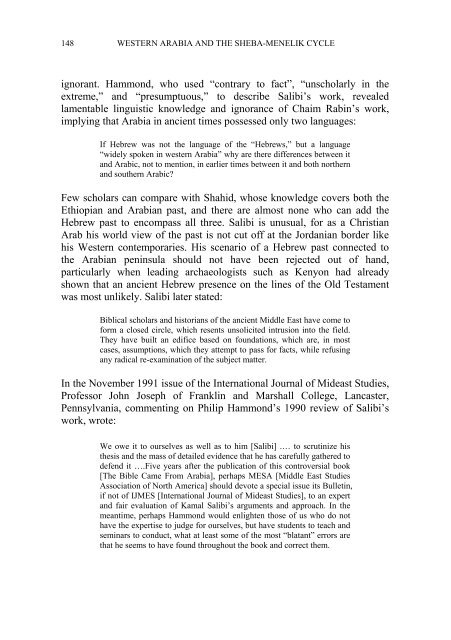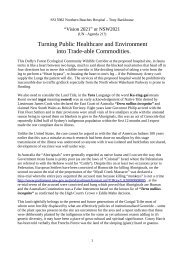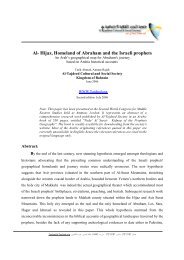Sheba
Sheba
Sheba
Create successful ePaper yourself
Turn your PDF publications into a flip-book with our unique Google optimized e-Paper software.
148<br />
WESTERN ARABIA AND THE SHEBA-MENELIK CYCLE<br />
ignorant. Hammond, who used “contrary to fact”, “unscholarly in the<br />
extreme,” and “presumptuous,” to describe Salibi’s work, revealed<br />
lamentable linguistic knowledge and ignorance of Chaim Rabin’s work,<br />
implying that Arabia in ancient times possessed only two languages:<br />
If Hebrew was not the language of the “Hebrews,” but a language<br />
“widely spoken in western Arabia” why are there differences between it<br />
and Arabic, not to mention, in earlier times between it and both northern<br />
and southern Arabic?<br />
Few scholars can compare with Shahid, whose knowledge covers both the<br />
Ethiopian and Arabian past, and there are almost none who can add the<br />
Hebrew past to encompass all three. Salibi is unusual, for as a Christian<br />
Arab his world view of the past is not cut off at the Jordanian border like<br />
his Western contemporaries. His scenario of a Hebrew past connected to<br />
the Arabian peninsula should not have been rejected out of hand,<br />
particularly when leading archaeologists such as Kenyon had already<br />
shown that an ancient Hebrew presence on the lines of the Old Testament<br />
was most unlikely. Salibi later stated:<br />
Biblical scholars and historians of the ancient Middle East have come to<br />
form a closed circle, which resents unsolicited intrusion into the field.<br />
They have built an edifice based on foundations, which are, in most<br />
cases, assumptions, which they attempt to pass for facts, while refusing<br />
any radical re-examination of the subject matter.<br />
In the November 1991 issue of the International Journal of Mideast Studies,<br />
Professor John Joseph of Franklin and Marshall College, Lancaster,<br />
Pennsylvania, commenting on Philip Hammond’s 1990 review of Salibi’s<br />
work, wrote:<br />
We owe it to ourselves as well as to him [Salibi] .… to scrutinize his<br />
thesis and the mass of detailed evidence that he has carefully gathered to<br />
defend it ….Five years after the publication of this controversial book<br />
[The Bible Came From Arabia], perhaps MESA [Middle East Studies<br />
Association of North America] should devote a special issue its Bulletin,<br />
if not of IJMES [International Journal of Mideast Studies], to an expert<br />
and fair evaluation of Kamal Salibi’s arguments and approach. In the<br />
meantime, perhaps Hammond would enlighten those of us who do not<br />
have the expertise to judge for ourselves, but have students to teach and<br />
seminars to conduct, what at least some of the most “blatant” errors are<br />
that he seems to have found throughout the book and correct them.




